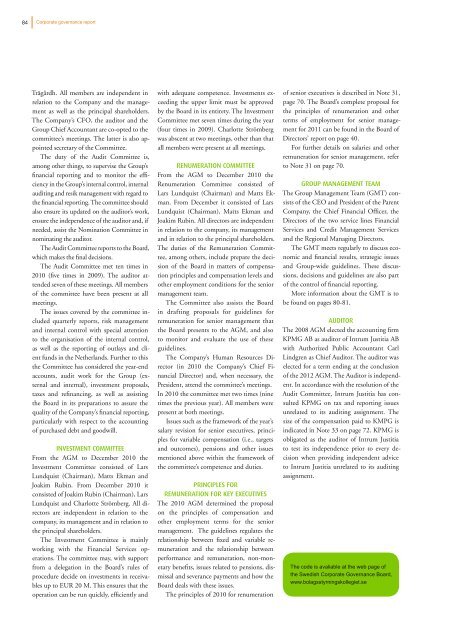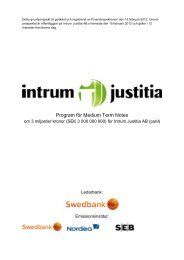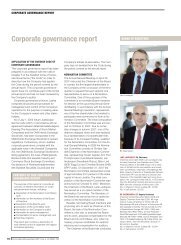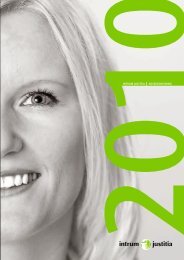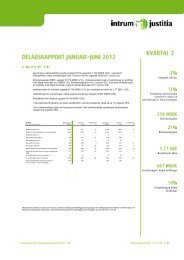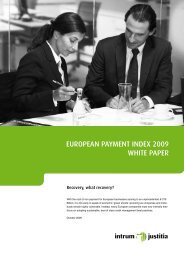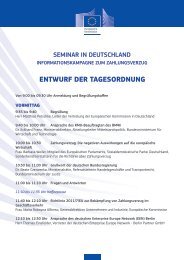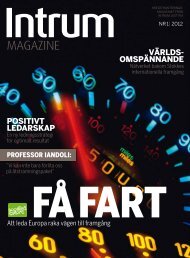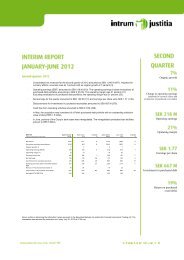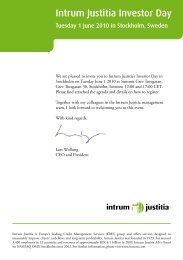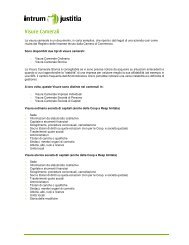ANNUAL REPORT INTRUM JUSTITIA A N N U A L R EP O R T 2 0 ...
ANNUAL REPORT INTRUM JUSTITIA A N N U A L R EP O R T 2 0 ...
ANNUAL REPORT INTRUM JUSTITIA A N N U A L R EP O R T 2 0 ...
Create successful ePaper yourself
Turn your PDF publications into a flip-book with our unique Google optimized e-Paper software.
84<br />
Corporate governance report<br />
Trägårdh. All members are independent in<br />
relation to the Company and the management<br />
as well as the principal shareholders.<br />
The Company’s CFO, the auditor and the<br />
Group Chief Accountant are co-opted to the<br />
committee’s meetings. The latter is also appointed<br />
secretary of the Committee.<br />
The duty of the Audit Committee is,<br />
among other things, to supervise the Group’s<br />
financial reporting and to monitor the efficiency<br />
in the Group’s internal control, internal<br />
auditing and resik management with regard to<br />
the financial reporting. The committee should<br />
also ensure its updated on the auditor’s work,<br />
ensure the independence of the auditor and, if<br />
needed, assist the Nomination Committee in<br />
nominating the auditor.<br />
The Audit Committee reports to the Board,<br />
which makes the final decisions.<br />
The Audit Committee met ten times in<br />
2010 (five times in 2009). The auditor attended<br />
seven of these meetings. All members<br />
of the committee have been present at all<br />
meetings.<br />
The issues covered by the committee included<br />
quarterly reports, risk management<br />
and internal control with special attention<br />
to the organisation of the internal control,<br />
as well as the reporting of outlays and client<br />
funds in the Netherlands. Further to this<br />
the Committee has considered the year-end<br />
accounts, audit work for the Group (external<br />
and internal), investment proposals,<br />
taxes and refinancing, as well as assisting<br />
the Board in its preparations to assure the<br />
quality of the Company’s financial reporting,<br />
particularly with respect to the accounting<br />
of purchased debt and goodwill.<br />
INVESTMENT COMMITTEE<br />
From the AGM to December 2010 the<br />
Investment Committee consisted of Lars<br />
Lundquist (Chairman), Matts Ekman and<br />
Joakim Rubin. From December 2010 it<br />
consisted of Joakim Rubin (Chairman), Lars<br />
Lundquist and Charlotte Strömberg. All directors<br />
are independent in relation to the<br />
company, its management and in relation to<br />
the principal shareholders.<br />
The Investment Committee is mainly<br />
working with the Financial Services operations.<br />
The committee may, with support<br />
from a delegation in the Board’s rules of<br />
procedure decide on investments in receivables<br />
up to EUR 20 M. This ensures that the<br />
operation can be run quickly, efficiently and<br />
with adequate competence. Investments exceeding<br />
the upper limit must be approved<br />
by the Board in its entirety. The Investment<br />
Committee met seven times during the year<br />
(four times in 2009). Charlotte Strömberg<br />
was abscent at two meetings, other than that<br />
all members were present at all meetings.<br />
RENUMERATION COMMITTEE<br />
From the AGM to December 2010 the<br />
Renumeration Committee consisted of<br />
Lars Lundquist (Chairman) and Matts Ekman.<br />
From December it consisted of Lars<br />
Lundquist (Chairman), Matts Ekman and<br />
Joakim Rubin. All directors are independent<br />
in relation to the company, its management<br />
and in relation to the principal shareholders.<br />
The duties of the Remuneration Committee,<br />
among others, include prepare the decision<br />
of the Board in matters of compensation<br />
principles and compensation levels and<br />
other employment conditions for the senior<br />
management team.<br />
The Committee also assists the Board<br />
in drafting proposals for guidelines for<br />
remuneration for senior management that<br />
the Board presents to the AGM, and also<br />
to monitor and evaluate the use of these<br />
guidelines.<br />
The Company’s Human Resources Director<br />
(in 2010 the Company’s Chief Financial<br />
Director) and, when necessary, the<br />
President, attend the committee’s meetings.<br />
In 2010 the committee met two times (nine<br />
times the previous year). All members were<br />
present at both meetings.<br />
Issues such as the framework of the year’s<br />
salary revision for senior executives, principles<br />
for variable compensation (i.e., targets<br />
and outcomes), pensions and other issues<br />
mentioned above within the framework of<br />
the committee’s competence and duties.<br />
PRINCIPLES fOR<br />
REMUNERATION fOR KEY EXECUTIVES<br />
The 2010 AGM determined the proposal<br />
on the principles of compensation and<br />
other employment terms for the senior<br />
management. The guidelines regulates the<br />
relationship between fixed and variable remuneration<br />
and the relationship between<br />
performance and remuneration, non-monetary<br />
benefits, issues related to pensions, dismissal<br />
and severance payments and how the<br />
Board deals with these issues.<br />
The principles of 2010 for renumeration<br />
of senior executives is described in Note 31,<br />
page 70. The Board’s complete proposal for<br />
the principles of renumeration and other<br />
terms of employment for senior management<br />
for 2011 can be found in the Board of<br />
Directors’ report on page 40.<br />
For further details on salaries and other<br />
remuneration for senior management, refer<br />
to Note 31 on page 70.<br />
GROUP MANAGEMENT TEAM<br />
The Group Management Team (GMT) consists<br />
of the CEO and President of the Parent<br />
Company, the Chief Financial Officer, the<br />
Directors of the two service lines Financial<br />
Services and Credit Management Services<br />
and the Regional Managing Directors.<br />
The GMT meets regularly to discuss economic<br />
and financial results, strategic issues<br />
and Group-wide guidelines. These discussions,<br />
decisions and guidelines are also part<br />
of the control of financial reporting.<br />
More information about the GMT is to<br />
be found on pages 80-81.<br />
AUDITOR<br />
The 2008 AGM elected the accounting firm<br />
KPMG AB as auditor of Intrum Justitia AB<br />
with Authorized Public Accountant Carl<br />
Lindgren as Chief Auditor. The auditor was<br />
elected for a term ending at the conclusion<br />
of the 2012 AGM. The Auditor is independent.<br />
In accordance with the resolution of the<br />
Audit Committee, Intrum Justitia has consulted<br />
KPMG on tax and reporting issues<br />
unrelated to its auditing assignment. The<br />
size of the compensation paid to KMPG is<br />
indicated in Note 33 on page 72. KPMG is<br />
obligated as the auditor of Intrum Justitia<br />
to test its independence prior to every decision<br />
when providing independent advice<br />
to Intrum Justitia unrelated to its auditing<br />
assignment.<br />
The code is avaliable at the web page of<br />
the Swedish Corporate Governance Board,<br />
www.bolagsstyrningskollegiet.se


